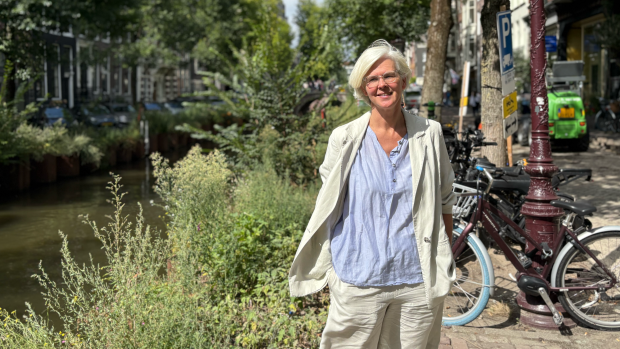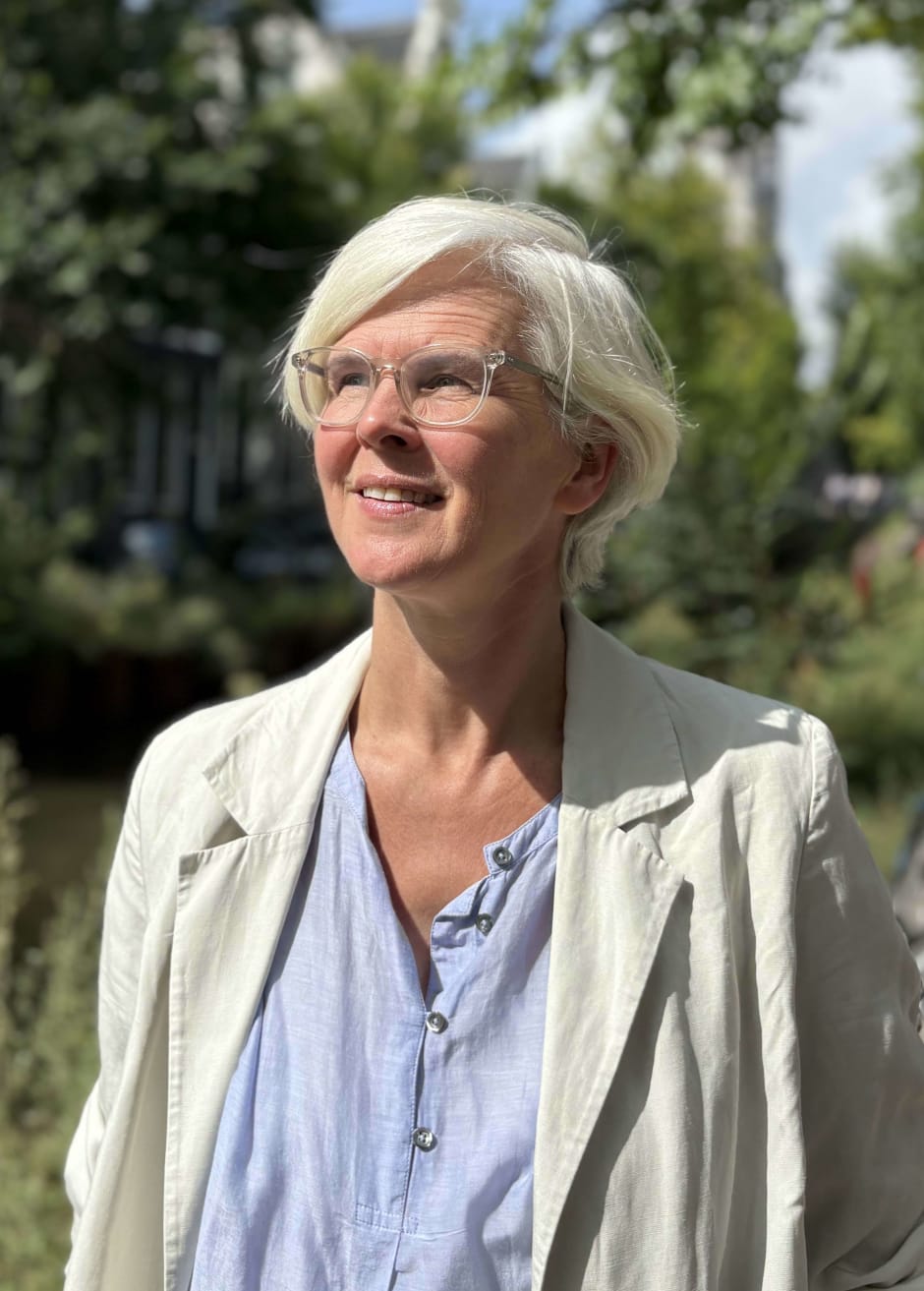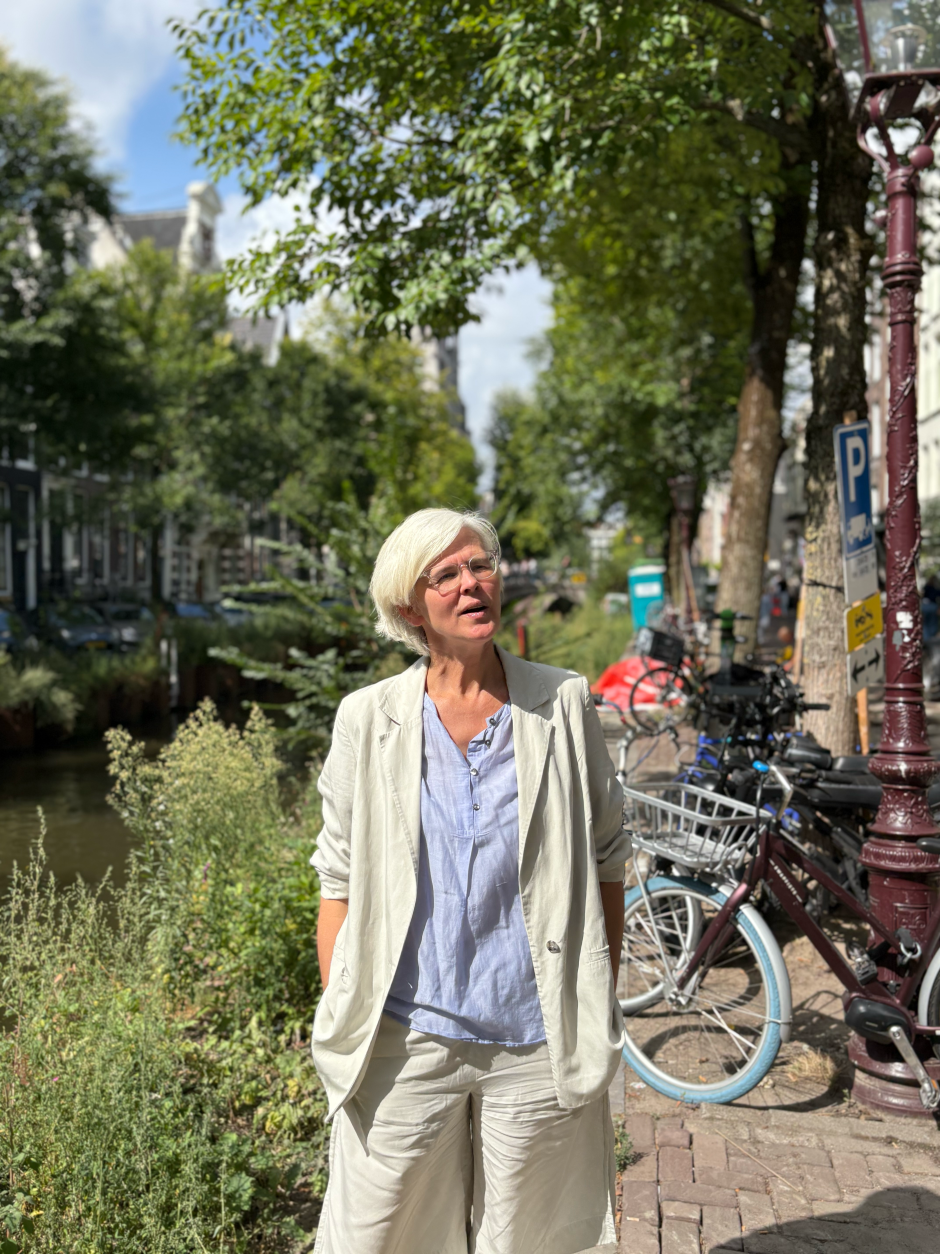
Ellen Rutten (49) is stepping down as professor at the UvA: “My role as a Slavicist has run its course”
UvA professor Ellen Rutten (49) is leaving as professor at the UvA. Since Russia’s large-scale invasion of Ukraine in 2022, she feels that research is like “sitting still” and wants to contribute more actively to society. The chair in Slavic Literatures will therefore remain vacant for the time being. “That’s the hardest part of this step for me.”
On her last day at work, Ellen Rutten’s (49) key no longer works on the door of her office in the P. C. Hoofthuis. Three new names adorn the sign next to the door. And so the professor of Slavic literature and the Folia editor retreat to a bench by the canal, where they sit among the tourists in the August sun. “It’s a very strange day. I think I’ll go and have an ice cream after this interview to celebrate.”
Her departure is certainly remarkable. Professors are appointed for life and rarely leave of their own accord before reaching retirement age. Some continue to work even after that. For Rutten, that is no longer an option. At least, not at the UvA. On 1 September, she will start working as a freelancer, focusing on collaborations between museums and universities. Rutten does not want to draw widespread media attention to this “radical U-turn”, but she did share her story with Folia.
Why are you leaving your position as professor at the UvA?
“On 24 February 2022, the day of Russia’s large-scale invasion of Ukraine, I felt that I no longer wanted to “sit still”. Of course, doing research is not sitting still, but that’s how it felt to me since that day. I felt good when I was working on my ngo UNE (a European aid programme that Rutten set up with colleagues for threatened students, academics and artists from Eastern Europe, ed.), but much less so when I was working on my UvA work.”

“I am concerned about the intense political developments in the world, not only in Eastern Europe. Now it is Nigel Farage in England who is at the top of the polls and has very nasty plans for migrants. I have a very strong desire to ‘push back’ and bring the good guys together. People who want to work together and build connections.”
Can’t you achieve more as a professor than as a self-employed person?
“Professors can indeed play a very active social role. But for me, it was also important that I gradually noticed that I felt moderately comfortable in the role of mentor or professor. I feel comfortable learning things myself, thinking at a high level, but less so in a role where I tell people how things are.
That’s not my favourite role.”
“My decision was ultimately the sum of everything. The workload also played a role. I became a professor at a young age, at 36, and since then I have rarely felt at rest. I am not someone who likes to work 60 to 80 hours a week. I have always managed to maintain a reasonably manageable working week and also spend time with my husband and daughter. But the price I paid for that was that I was a rather confused person all the time. Always tired, always doing ten things at once. Perhaps if I had started my professorship later, I would now be ready for a busy job. But after thirteen years of unrest, a place in the quiet is now more suitable.”
Ellen Rutten (49) obtained her PhD in Groningen as a Slavicist on the image of Russia as a bride and worked as a postdoc at the universities of Cambridge and Bergen, Norway. In 2012, at the age of 36, she became a professor of Slavic Studies at the University of Amsterdam. Since 2024, she has been working as a supervisor at the Noord-Brabants Museum. As of 1 September 2025, she will be professor emeritus at the UvA and will be working as a freelancer under the name Academy-Museum Synergies (AMS) on collaborations between museums, heritage organisations and universities.
“As a professor of languages, part of your job is to constantly defend the raison d’être of your field. I always did that with love, including in the media, but at a certain point, I was done. With the arrival of the sector plans under Dijkgraaf, when it became financially easier for all fields, only language programmes were subject to efficiency requirements. That was the last straw for me. I think it’s healthier for me not to get bitter about it and to do something else.”
“And then there was the UvA’s response to the recent student protests, which did made me feel uncomfortable. That wasn’t the reason for my departure, but it does mean that I’m leaving with a light heart.”
“I want to emphasise that my decision is ultimately a personal one. What’s more, the Faculty of Humanities at the UvA is coming up with some excellent initiatives in response to the pressure of budget cuts.”
You spent more than 25 years researching Russia through its language and culture. How did you see the country develop and what lies ahead?
“I don’t think war will break out next year, but I do think there are difficult years ahead. There are already all kinds of threats and interference from Russia, and according to experts, this is not going to diminish in the coming years.”
“For me, 2014 was an important turning point, when Russia occupied Crimea and the war in Ukraine began. For a long time, I proclaimed in the lecture hall that we think far too negatively about Russia, but from then on, it’s very violent side also became apparent. Since 2020, I have seen Russia move very rapidly towards totalitarianism – since 2022, it has been almost caricatural – and I have seen many people become victims of repression in Russia and Belarus. I am not a propaganda expert, but through experts I follow how aggressive that propaganda is towards Western Europe. People there are fed it every day.”
Are we sufficiently aware of this threat?
“No, I don’t think so. At the level of the European Union and ministries, there is awareness, but it is quite difficult to really convey that to a wider audience. We are at a tipping point, but we don’t really want to hear about it. We just want to enjoy our caffè lattes and do fun things. I sometimes catch myself looking at Funda before and after reading the news. Not because I want to move, but just to be able to cope with the world again.”
Isn’t research into Slavic studies important for that awareness?
“In fact, research into the cultural history of Eastern Europe is absolutely crucial to coping with current developments. And I think science is just as important as it was before. But for me, the role of Slavic studies scholar has not worked well since 24 February.”
Still, giving up a chair is no small step. What ultimately convinced you to quit your job?
“The war made me realise that something was wrong. I was stuck. You might call it overwork, but often it’s not that you can’t handle the pressure, but that something else is getting in the way. I realised: oh dear, I don’t want this job anymore, but I can’t leave because of the chair.”

“In the autumn of 2023, I stopped working for a while. I noticed that I quickly started to feel happier. During that period, I often went to museums. After that, I gradually started rebuilding my work at the University of Amsterdam, but I was very sure that I wanted to do something else. On the advice of museum directors in my network, I did a kind of internship-like collaboration with Rijksmuseum Twenthe, and we discovered that I was good at setting up collaborations with universities.”
How can museums change political developments in the Netherlands and the world?
“Museums can play a pioneering role in thinking about issues such as climate change and colonialism and in drawing public attention to problems across the board. This works even better in collaboration with knowledge institutions. How wonderful would it be if a research institute such as Clingendael were to collaborate sustainable with museums to raise public awareness of the threat posed by Russia? This is a way in which both parties can gain more influence among new groups. I think that would be fantastic.”
You are leaving at a difficult time, with the pressure of cutbacks on small language studies. What will happen to the chair in Slavic literature?
“There is a serious chance that there will no longer be a chair in Slavic literatures. That is the most difficult thing about this step for me, that the chair may disappear because of a personal decision I have made.”
“I can’t sugarcoat it. At first, it felt like betrayal. I didn’t take this decision lightly and it was very difficult for me emotionally for a while. But I’ve come to terms with it now. I can’t keep doing work I don’t enjoy, because physically I can’t. But it still, well, sucks. Whether that chair will be filled is no longer up to me. I can only hope that there is sufficient awareness that the Netherlands, also for security reasons, really cannot do without a chair in Central and Eastern European literature.”
Will you also lose your title of professor when you leave?
“I am now an emeritus professor (emeritus is Latin for “retired” or “in retirement”, ed.). I’ve decided not to put that on my front door, haha. But at the right moments, it can still be useful to use.”
How does your last day at work feel?
“I feel good about it and think this decision is the right one. On the day I knew for sure that I was leaving, it was as if I saw the paving stones for the first time, could really see the city again, the birds flying overhead... That feeling has stayed with me. Still, it’s also scary. I’m going from a very stable job to a position as a self-employed person.”
“I have achieved what was once my dream: publishing a book with Yale University Press, writing a chapter for the Cambridge History of Russian Literature. All those dreams have now come true. I believe I have now made the most of what I could achieve as a professor.”


